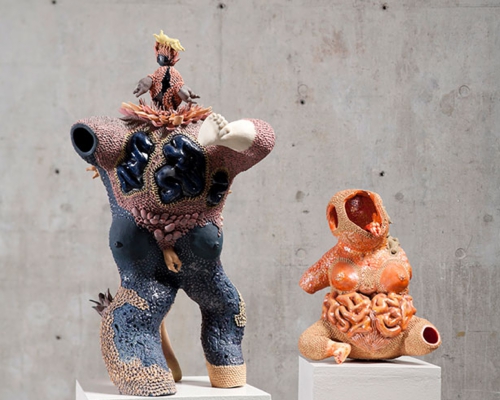Beauty is Ugly and Ugliness is Beautiful
Research Report of Graduate Works,
The Graduate School of Fine Arts,
Master's Programs of Ceramic Course,
Tama Art University, Japan

Picture Left: The hope of shadow / 2010/ Ceramic,glass / W23×D22×H43cm Right : The shadow of hope / 2010/ Ceramic , glass / W23×D17×H28cm
Why do people distinguish beauty and ugliness? And why are we attracted to the inexplicable and ugly when we pursue beauty? We have fragile sense of value and intense bias at the same time. We understand the world by comparing concepts opposite to each other such as “Beauty” and “Ugliness”, “Good” and “Evil”, “Heaven” and “Hell”. I believe there is great self denial underlying this world polarized by people. There is “I” who performs denial of the self among daily “decisions”. While sometimes thought of as trivial, for we whose lives are constructed of a mass of overlaid flash decisions, those trivial decisions could be called the cells that constitute ourselves.
That which occurs within a human cannot be partitioned simply, but is instead connected as a as a whole like a raging ocean. To polarize, or simply divide all of such a large internal world could be said to be complete denial of a part of oneself. Because when we say yes to one side, other possibilities would be denied and disappear. When we see, feel and think something, the two parts polarized by consciousness are not truly separate entities, but exist relative to each other. I think we can be able to see every part of our inner world by obscuring the borders of both poles. In order to obscure the boundary, turmoil of the heart needs to be caused, and practical research has been done for the purpose of creating expression which stirs people's feeling. In order to prove the existence of heaven, people created the concept of hell in religion long ago, which slid into people's hearts and took root. We try to see hell in our inner world. Because in our inner world there is a hell that we created ourselves. I think hell begins when we deny ourselves. Our fear in daily life is a shadow of anxiety and at the same time it reflects our hope. People seek salvation, precisely because they believe in hell. And so people imbued gods with strange figures since ancient times, and found mystery within them. Further, God must be of a mysterious existence, so that people can create mystery from it. Strange things are not only monsters and demons, unpleasant or taboo things, but gods are also things where people search for strangeness.
After the passing of the Renaissance greatly changed the world, people turned their interest to mysterious things unrelated to religion. It could be said that such interest has been craved by people and became even an obsession in subsequent history as well. And in this time, novelty became ordinary. We want the extraordinary to exist in our lives, and still crave it. Advertising is one thing where the world where peculiarity and complexes were wrapped in the veil of "loveliness" and "beauty" also exists. The advertisements with which our lives is flooded from the first are influenced by the surrealism of the art forms which rose in the 1920s. The wild concepts and works charmed people, and commerce carried it into industry. If the words of Albert Camus (1913 - 1960) who is a French novelist are borrowed, the aesthetics of surrealism will be "absolute resistance, all-out disobedience, the subversive activity, the humor, and faith in non-reason". Are such aesthetics applied in the present age where the extraordinary is overflowing? In present-day, the soul of surrealism no longer exists. What stands up is a complex created by ourselves, which is dressed up by novelty and beauty(something defined as beautiful ) that defies people's expectations. I think that it is the obsession which is needed for the economy in our present world. TV commercials urge people to be beautiful, smart, and to not be as you are now, policies chosen by society. Although people hold an ideal, I have a sense of discomfort with respect to the destination of an ideal that seems to be controlled by something. Because I think an ideal human, what society judges to be desirable person to be, is not always the same what individuals truly seek as ideal.
I harbor doubts about the current excessive number of people seeking physical beauty, which has been boosted by technology. We are satisfied no matter how beautiful we make our body, and ourselves understand the fundamental hollowness of it. Leaving the heart far behind involves severe pain when we deny ourselves self expression. Therefore, I want to carry out expression that feels beautiful, ugly and attractive. Though people's minds are very ambiguous, it can not lie about what he or she really feels. I want to throw mud at people's white shirts through my work. I think that we can see a kind of map that shows who we really are in stains of clothes that were smudged when everybody was free and wild.
Books for reference:Romi, Translated by Hiromi Takatou, Historie de L’insolite, Heibonsha, 2010